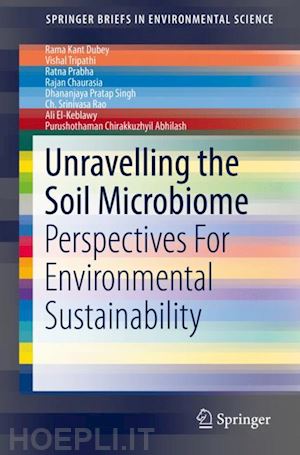
Questo prodotto usufruisce delle SPEDIZIONI GRATIS
selezionando l'opzione Corriere Veloce in fase di ordine.
Pagabile anche con Carta della cultura giovani e del merito, 18App Bonus Cultura e Carta del Docente
This book explores the significance of soil microbial diversity to understand its utility in soil functions, ecosystem services, environmental sustainability, and achieving the sustainable development goals. With a focus on agriculture and environment, the book highlights the importance of the microbial world by providing state-of-the-art technologies for examining the structural and functional attributes of soil microbial diversity for applications in healthcare, industrial biotechnology, and bioremediation studies. In seven chapters, the book will act as a primer for students, environmental biotechnologists, microbial ecologists, plant scientists, and agricultural microbiologists.
Chapter 1 introduces readers to the soil microbiome, and chapter 2 discusses the below ground microbial world. Chapter 3 addresses various methods for exploring microbial diversity, chapter 4 discusses the genomics methods, chapter 5 provides the metaproteomics and metatranscriptomics approaches and chapter 6 details the bioinformatics tools for soil microbial community analysis, and chapter 7 concludes the text with future perspectives on further soil microbial uses and applications.Dr. Rama Kant Dubey is a doctoral research fellow, working in the area of plant-microbe interactions, sustainable agriculture and soil system sustainability at Institute of Environment & Sustainable Development, Banaras Hindu University, India. Being a Green Talent Awardee (BMBF, Govt. of Germany), he has also worked as a Guest Researcher at Helmholtz Zentrum München, Neuherberg, Germany. He did his MSc. in Industrial Microbiology from Devi Ahilya Vishwavidyalaya, Indore. He has received AU-CBT Excellence Award of Biotech Research Society of India, and NASI-Swarna Jayanti Puraskar’ from the and National Academy of Sciences, India. Mr. Dubey has been serving as an active member for the Commission on Ecosystem Management (CEM), IUCN and serving as an Editor of the ‘Agroecosystems Newsletter’ of the IUCN-CEM Agroecosystems Specialist Group and special issue in Agronomy (MDPI). He is also serving as an expert reviewer for the various international research journalsfrom Elsevier, Springer-Nature, Wiley, and PLOS.
Dr. Vishal Tripathi is a Research Scholar at the Institute of Environment and Sustainable Development, Banaras Hindu University. His research interest lies in restoration and management of polluted lands and understanding the plant-microbe-pollutant interactions under changing climate to develop future remediation strategies. He has been recipient of the prestigious Green Talents Award of the Federal Ministry of Education & Research (BMBF), Germany for the year 2018. He has also been conferred with AU-CBT Research Excellence award of The Biotech Research Society of India, for the year 2016. He is a member of the Commission on Ecosystem Management (CEM) and serving as an expert reviewer for several international journals namely Scientific Reports (Nature Publishing Group), Biomass and Bioenergy (Elsevier), Agronomy for Sustainable Development (Springer), Restoration Ecology (Wiley), Biodegradation (Springer), Environmental Management (Springer), PLOS One (PLOS), Energy, Ecology & Environment (Springer).
Dr. Ratna Prabha is a SERB-National Postdoctoral Fellow (DST, Govt. of India) at Chhattisgarh Swami Vivekanda Technical University, Bhilai. She obtained her master’s degree in Bioinformatics from Banasthali Vidyapeeth and Ph.D. in Biotechnology from Mewar University, India. She has been engaged in developing various digital databases on plants and microbes and has published two edited books, many book chapters, and various research papers and review articles in journals of international repute. Her current research interest lies in microbe-mediated stress management in plants, database development, comparative microbial genome analysis, phylogenomics and pangenome analysis of prokaryotic genomes, and metagenomics data analysis. She has completed several bioinformatics demonstration tasks at different national training programs on bioinformatics and computational biology. She has been awarded the Young Scientist Award at G. B. Pant University of Agriculture and Technology; S&T SIRI, Telangana; and CGCOST, Chhattisgarh.
Dr. Rajan Chaurasia is a Research Fellow (CSIR-NET-JRF) at the Institute of Environmental and Sustainable Development, Banaras Hindu University. His research interests are crop diversification, emerging cropping patterns, plant-microbe interactions, microbial diversity and sustainable agriculture. He has received Young Scientist Travel Award from International Union of Biological Sciences (IUBS), Paris. He is a life member of the Association of Environmental Analytical Chemistry of India (AEACI), Society for Science of Climate Change and Environmental Sustainability and active member of Global Land Programme (GLP), Global Soil Biodiversity Initiative, (GSBI) and Commission on Ecosystem Management of IUCN.
Dr. Dhananjaya Pratap Singh is a Principal Scientist inbiotechnology at ICAR-National Bureau of Agriculturally Important Microorganisms (NBAIM), Maunath Bhanjan, India. He obtained his master’s degree from G. B. Pant University of Agriculture and Technology, Pantnagar, and Ph.D. in Biotechnology from Banaras Hindu University, Varanasi. His research interests include plant-microbe interactions, bio-prospecting of metabolites of microbial and plant origin, microbe mediated stress management in plants, metabolomics-driven search for small molecules, and bioinformatics in microbial research. He was involved in the development of a supercomputational facility for agricultural bioinformatics in the microbial domain at ICAR-NBAIM under the National Agricultural Bioinformatics Grid (NABG) program of ICAR. He has been awarded with various prestigious awards including the Dr. A. P. J. Abdul Kalam Award for Scientific Excellence in 2016 by Marina Labs. He has more than 134 publications and one Indian patent to his credit.
Dr. Ch. SrinivasaRao











Il sito utilizza cookie ed altri strumenti di tracciamento che raccolgono informazioni dal dispositivo dell’utente. Oltre ai cookie tecnici ed analitici aggregati, strettamente necessari per il funzionamento di questo sito web, previo consenso dell’utente possono essere installati cookie di profilazione e marketing e cookie dei social media. Cliccando su “Accetto tutti i cookie” saranno attivate tutte le categorie di cookie. Per accettare solo deterninate categorie di cookie, cliccare invece su “Impostazioni cookie”. Chiudendo il banner o continuando a navigare saranno installati solo cookie tecnici. Per maggiori dettagli, consultare la Cookie Policy.